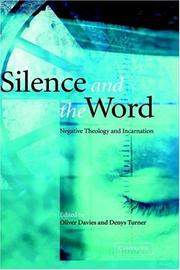| Listing 1 - 3 of 3 |
Sort by
|
Book
ISBN: 900444436X 9004444351 Year: 2021 Publisher: Leiden; Boston : BRILL,
Abstract | Keywords | Export | Availability | Bookmark
 Loading...
Loading...Choose an application
- Reference Manager
- EndNote
- RefWorks (Direct export to RefWorks)
After-Mission touches on on three questions.The first question is about self-perception and identity-formation strategies, and the various views that we have on the Protestants' relation to their Arab Muslim Middle Eastern context. This will furnish the basis for the ensuing parts, as it will provide the study with coherent and analytical readings of the cultural situation and intellectual views of the Arab Eastern Protestants in their Sitz im Leben from the perspective of the hermeneutic tripod of 'identity-othering-relationality'. The second question, about the theological dimension, asks what kind of a theological discourse do the Protestants need to develop, and how do they need to re-form their own theological heritage, in such a manner that will allow them to heal the historical enmity and suspicion towards them from the Eastern Orthodox Christian community in the region? How should they re-think their traditional view on theological subjects common to them and the Eastern Christian tradition? Traditional Protestant attitudes towards Eastern Christianity, which have been viewed through the lens of evangelicalism and mission, have failed to grant the Protestants an influential and truly indigenous presence in the region and have led to them being constantly accused of being a foreign transplant and alien entity. In the light of this, it is clear that going beyond missiology and traditional evangelicalism demands re-thinking certain mutually shared but contentious theological subjects from a new perspective with the focus on more constructive attempts to build fellowship through dialogue. Finally, the third question touches on the Protestants' future in the Arab Muslim Middle East by viewing this inquiry from a broader perspective that is related to all the Middle Eastern Christian communities' presence and role in the Muslim-majority context. It will discuss questions about the kind of presence and role that Christians, Protestants included, should hope to play in order to guarantee survival and a continuing presence in the region. The question of identity formation, and the managing of difference without trapping it in the mud of 'otherizing and self-otherizing', will also be tackled, so that the theological dimension is integrated with the broader, multifaceted contextual one.
Christianity --- Protestantism --- Arab countries. --- History --- Arab countries --- Church history. --- Church history --- Protestant churches --- Reformation --- Religions --- Arab world --- Arabic countries --- Arabic-speaking states --- Islamic countries --- Middle East --- Theology,Christianity. --- Christians --- Theology. --- Religious adherents

ISBN: 0521817188 0521067391 1107126010 0511176864 0511042698 0511157762 0511325614 0511487657 1280434333 0511054440 9780521817189 9780511042690 9780511054440 9780511487651 9780521067393 9781107126015 9781280434334 9780511176869 9780511157769 9780511325618 Year: 2002 Publisher: Cambridge Cambridge University Press
Abstract | Keywords | Export | Availability | Bookmark
 Loading...
Loading...Choose an application
- Reference Manager
- EndNote
- RefWorks (Direct export to RefWorks)
Negative theology or apophasis - the idea that God is best identified in terms of 'absence', 'otherness', 'difference' - has been influential in modern Christian thought, resonating as it does with secular notions of negation developed in continental philosophy. Apophasis also has a strong intellectual history dating back to the early Church Fathers. Silence and the Word both studies the history of apophasis and examines its relationship with contemporary secular philosophy. Leading Christian thinkers explore in their own way the extent to which the concept of the apophatic illumines some of the deepest doctrinal structures of Christian faith, and of Christian self-understanding both in terms of its historical and contemporary situatedness, showing how a dimension of negativity has characterised not only traditional mysticism but most forms of Christian thought over the years.
Negative theology --- Christianity --- Natural theology --- Christian theology --- 232.8 --- -232.8 Jezus Christus als mens. Menswording. Incarnatie --- Jezus Christus als mens. Menswording. Incarnatie --- Apophatic theology --- Via negativa (Theology) --- 232.8 Jezus Christus als mens. Menswording. Incarnatie --- Arts and Humanities --- Religion --- Negative theology - Christianity - Congresses
Book
ISBN: 9789004472563 9789004472471 9004472479 9004472568 Year: 2022 Publisher: Leiden : Brill,
Abstract | Keywords | Export | Availability | Bookmark
 Loading...
Loading...Choose an application
- Reference Manager
- EndNote
- RefWorks (Direct export to RefWorks)
"The biblical book of Jeremiah was frequently expanded and revised through duplication by anonymous scribes in ancient Judea. Who were these scribes? What gave them the authority to revise divinatory texts like Jeremiah? And when creating duplicates, what did they think they were doing? In Scribes Writing Scripture: Doublets, Textual Divination, and the Formation of Jeremiah, Justus Theodore Ghormley explores possible answers to these questions. The scribes who revised Jeremiah are textual diviners akin to divining scribal scholars of ancient Near Eastern royal courts; and their practice of expanding Jeremiah through duplication involves techniques of textual divination comparable the practice of textual divination utilized in the formation of ancient Near Eastern divinatory texts"--
Theology,Christianity --- Scribes, Jewish --- Divination in the Bible --- 224.3 --- History --- Jeremias. Lamentationes. Klaagliederen --- Bible. --- Criticism, interpretation, etc. --- Authorship. --- Sofer --- Soferim --- Sofrim --- Sopher --- Sopherim --- Sophrim --- Judaism --- 224.3 Jeremias. Lamentationes. Klaagliederen --- 224.3 Jeremie. Lamentations de Jeremie --- Jeremie. Lamentations de Jeremie --- Functionaries --- Jeremiabuch --- Jeremiah (Book of the Old Testament) --- Jérémie (Book of the Old Testament) --- Livre de Jérémie --- Yirmeyah (Book of the Old Testament) --- Yirmeyahu (Book of the Old Testament) --- Scribes, Jewish.
| Listing 1 - 3 of 3 |
Sort by
|

 Search
Search Feedback
Feedback About UniCat
About UniCat  Help
Help News
News